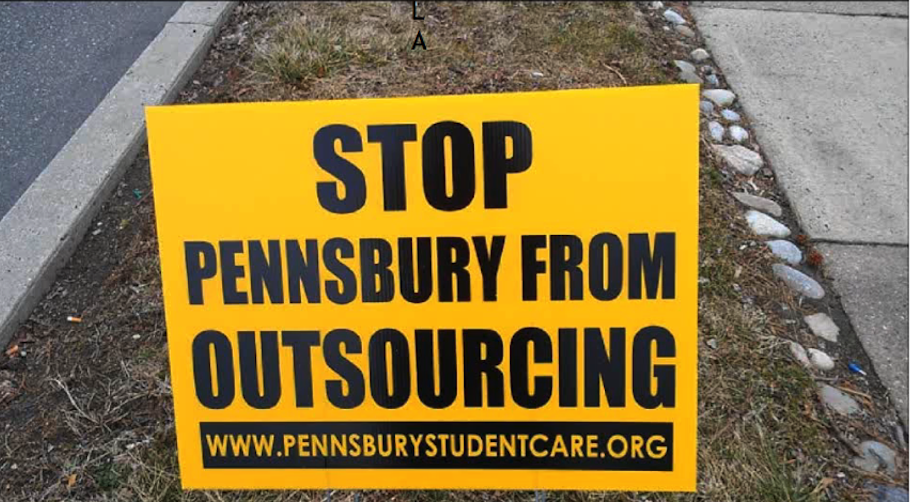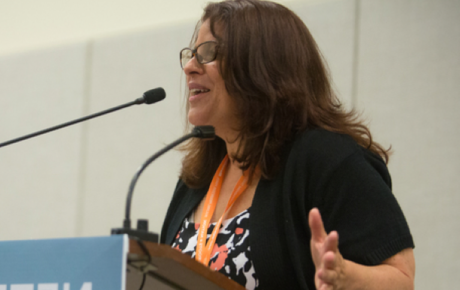 The private email sent by board member Simon Campbell of the Pennsbury School District in Pennsylvania was not meant for public consumption. But it was leaked to Donna Abrescia, a community activist and former part-time police officer who drove a school bus for the district.
The private email sent by board member Simon Campbell of the Pennsbury School District in Pennsylvania was not meant for public consumption. But it was leaked to Donna Abrescia, a community activist and former part-time police officer who drove a school bus for the district.
Campbell's email read: "We must outsource busing and break this union at any cost, even if it means having a less satisfactory busing solution." Abrescia was also a member of the Pennsbury Education Support Professionals Association (PESPA), the union Campbell mentions.
“It didn’t matter if our drivers were more efficient than those from a private company or if having in-house drivers was more cost effective for the district," says Abrescia, who has worked for the district for 26 years. "No, his single-minded agenda was simply to outsource busing and break the union."
The email was sent in 2010. At the time, Campbell and four other conservative trustees ruled the nine-member board with a collective iron fist. Together, they had proposed selling the district’s school bus fleet and outsourcing transportation services as well as other education support professional (ESP) jobs.
“Back then, we had a school board that was not educator friendly,” says PESPA President Marla Lipkin, an administrative assistant.
In response to the email and threat of privatization, Abrescia began to research data reports by the Pennsylvania Department of Education involving the outsourcing of transportations services.
"The next time I saw Campbell was at a board meeting when I presented the state's budget survey comparing the transportation costs by county of every district in the state, including those that were privatized with those that were not," Abrescia says. Out of 17 districts, only one showed expenditures below the state, regional or county averages.
"There was no evidence to suggest that outsourcing reduces student transportation costs," she says. "We (district drivers) were not only cheaper, we live, vote, shop, and worship in the community where we work. We're vested. Our children attend district schools."
As in Pennsbury, school boards across the nation sometimes turn to outsourcing as an ill-considered effort to raise quick cash, shore up budget gaps, or streamline operations. Whether they call it privatization, contracting out, subcontracting or outsourcing -- transferring the work of public school employees to the private sector leads to inferior services and fewer connections to students and their education.
In Pennsbury, however, some board members took the pernicious threat of outsourcing even further. For them, privatization was less a fiduciary strategy and more a means to weaken PESPA.
Battles on Two Fronts
By 2013, the board moved fast and loose distributing Requests for Proposals (RFPs) to subcontractors and accepting bids for transportation and custodial services, information technology specialists, instructional and non-instructional paraprofessionals. Employees from each of these groups were among PESPA’s 625 members, including 175 bus drivers.
“The board made it clear they wanted to bust the union,” Lipkin says. “No budgetary or financial constraints, poor performances or community complaints were cited.”
The board had a history of being hostile to unions. Previously, their union-busting agenda included the teacher-led Pennsbury Education Association (PEA).
“Since teachers couldn't be threatened with outsourcing, ESPs became the target,” Lipkin says.
Along with the battle against outsourcing on the policy front, PESPA negotiators were simultaneously bargaining a new contract with district officials. PESPA had been working under the terms of an expired contract since June 2011. On the bargaining front, members found themselves at risk of losing or compromising not only future jobs but their present positions.
“The board was throwing out RFPs for everything to see what might stick,” Lipkin says. “Even though no analytical evidence was being provided to support their argument for any RFPs.”
Finding New Players
By this time, PESPA members had begun to organize internally, form committees, and develop a strategy to fight the privatization threat. At the top of their to-do list: Identify and support community-minded, educator-friendly board members for the upcoming November 2013 board elections.
With months to go before the election, PESPA members worked evenings and weekends canvassing neighborhoods with flyers about the detriments of outsourcing school jobs. They created radio commercials that played during high school football games and on social media, sponsored information tables at school events, and purchased yellow yard signs with a website address and capitalized black letters that read: STOP PENNSBURY FROM OUTSOURCING.
“We did whatever we felt was necessary to show our community what a mistake it would be to let strangers transport our students,” Lipkin says.
Garnering Community Support
One concerned citizen who empathized with their plight was the inimitable Frank Arcoleo.
“I’m driving along and I see this yellow sign in someone’s yard about outsourcing,” says Arcoleo, a self-employed certified public accountant. “It got my attention, so I contacted the group.”
 Marla Lipkin
Marla Lipkin
The encounter with the sign took place in November 2012. Before long, Arcoleo was testifying against privatization at board meetings, hosting weekly PESPA organizing meetings at his house, and crunching numbers which blew holes in district reports regarding reduced costs through outsourcing. He and other citizens also established a nonprofit advocacy group, United Pennsbury.
“I don’t like to pay more money than I should for government services,” says Arcoleo, whose daughter, Emily, attends a public school. “But paying taxes for legitimate well-performed services is not only necessary, it’s patriotic.”
Of all his activities, Arcoleo might be best remembered for numerous appearances at board meetings where he would dispute perceived “phantom savings,” as he called them.
For example, school board solicitor Jeff Sultanik estimated that the sale of the bus fleet, equipment listing and inventory listing would be $3,987,285, or $797,457 per year covering transportation cost for five years.
“But what about year six and every year after that,” Arcoleo says. At a February board meeting, with one of his meticulous spreadsheets in hand, Arcoleo articulated the illusion behind the selling of school buses by using an analogy of a family selling their house and using the proceeds to pay rent.
“After a time, you’ve spent everything you received for the house, but you still need to pay rent – forever,” he told the board. “It’s clearly an accounting mistake to act as if the proceeds of an asset sale can legitimately be counted to offset increased operating costs.”
In addition, he told the board that outsourcing district jobs to out-of-town companies “would ruin the lives of our neighbors who would lose their jobs or, at best, have jobs with lower salaries, no health care, no retirement savings.”
During this time, Abrescia and other PESPA members began knocking on doors, talking with neighbors, and handing out flyers about outsourcing that Abrescia and her husband, David Ahrens, had financed. At one point, she and another member put 250 miles on her car over two days of placing flyers in mailboxes.
"We empowered ourselves and educated the community about outsourcing and what they could expect when a private company takes control of district school buses," she says. One challenge in getting the word out was scheduling precious free time from members to do the legwork.
"We told some of them, 'just do your street, just get your neighbors, just get 10 signatures,'" Abrescia says. "We hit flea markets, school fairs, and any gathering of residents we could find."
Eventually, Abresica organized a petition and with help from PESPA, United Pennsbury, parents, and others secured about 1,250 signatures from Republicans and Democrats alike. The petition was presented to the board.
Outsourcing Threat Lurks Over 2013 Contract
In August 2013, PESPA members and the board approved a new contract which was valid through June of this year.
Under that contract, PESPA compromised on several points, including higher health care co-payments and dependents being dropped from PESPA member plans. The contract did not include language restricting the district from using subcontractors. This would change with PESPA’s 2017 contract.
“With the two major outsourcing threats looming over us at the time, we knew we had to give up benefits to keep all of our classifications employed, so we did for the time being,” Lipkin says. “Everybody told me that once you give something up, you never get it back ... well, we got things back (in the 2017 contract).”
In the months that followed the contract signing, momentum had shifted in favor of PESPA and against the conservative members of the board, which is comprised of three members from three regions. In Region 1, two of the three members were up for re-election, including Campbell. Region 2 included three educator-friendly members, all returning. In Region 3, two members were running for re-election. In Pennsbury, where trustees serve four-year terms, elections involving board seats are staggered.
At the polls that November, PESPA needed at least two of the four candidates they endorsed to win their races in order to achieve a majority.
“We ended up winning all four available seats, which together with our other allies on the board (not up for re-election) gave us the majority,” Arcoleo says. “Community advocacy won the day.”
2017 Contract Addresses Outsourcing
In June, the board approved a five-year contract stating that the district will “not engage in any further subcontracting of Bargaining Unit work, unless there are no reasonably available qualified individuals to fill the position” and other similar provisions.
The contract also includes a yearly 1 percent pay increase and column and longevity movement. Members can also apply for a new health care plan starting in October. At first, the plan has higher co-pays for specialists and higher out of pocket maximums, but over five years members will pay the same family health care contribution rate as teachers -- 14 percent.
“During the last contract, we lost good support staff employees because they could not afford to work and pay for their health care benefits,” Lipkin says.
The new contract also restores coverage for dependents, includes bereavement language, increases sick leave days for part-time employees, and contains a differential rate for paraeducators working with emotional-support students.
“We worked for five years to regain respect and benefits that we, as essential school employees, deserve,” Lipkin says.
Abrescia adds: "It was a long drawn-out battle. You have to be the enforcer when it comes to your job, and I mean every ESP must do their part to beat outsourcing. We got the community in our corner by making it about who would be working with their kids ... strangers instead of neighbors."





